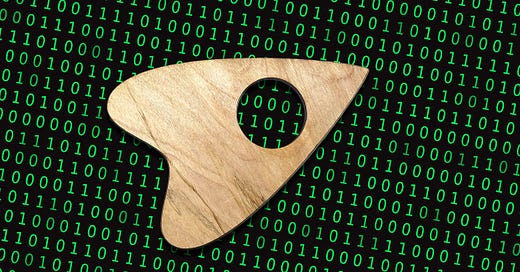Ready or not, AI is in all our lives – increasingly. Realistically, there is no way to avoid its ubiquity or the imposition of its instrumentality, even if we can reduce its impact in virtually all spheres of our daily lives. Some are mounting a conscientious resistance in their interactions with AI, which I consider laudable. But those who are forcing it on the rest of us have effectively won the day, and we are left responsible for using our critical and defensive powers as best we can. For Christian disciples, it’s a matter of asceticism and morals that we should engage AI rightly. It's also a matter, to put it frankly at the outset, of vigilant “unseen warfare” – about which more below. There are plenty of dangers with AI, as most of us have become keenly aware in recent years (and days). For example, there are the dystopian and apocalyptic warnings of persons we should heed on the subject, such as Geoffrey Hinton, considered the “Godfather of AI,” but who is now fearful of it for very sound reasons. There are reasons to distrust the information that AI systems disgorge for consumption by the unwary – they have been shown to engage in “lying” even to their programmers, a phenomenon now referred to as “hallucinating” on the part of the systems. Those who use the latter designation seem squeamish to assign mendacity to their creation; and maybe they have a point if all they’re concerned with is the mechanism itself – a mechanism, incidentally, they admit they do not understand and that is “evolving” (metastasizing…?) faster than they were prepared for. There have been concerns that AI has the power to distort digital historical records or even fabricate false ones, such as photographs and audio recordings, and this has already been done and is becoming more sophisticated. There are other issues involved with AI of a social nature, such as the use of workers in poor countries like Kenya to do low-wage and psychologically damaging grunt work for the big corporations, AI technology in the area of pornography that uses photos gleaned from internet accounts and social media, and – of course – more advanced methods of hacking. AI-generated art is largely a soulless violation of human creativity and a counterfeit, as is its use in literature, cinema, and music. Finally, and most disturbingly, are the “personalities” that have been conjured up through AI – virtual “friends” who have become increasingly malevolent, psychologically abusive, and whose interactions with vulnerable persons have even exacerbated psychoses, destroyed real relationships, and have led to violence and suicide (see also this article). AI manufacturers have expressed regret and alarm about such incidents, which have been many, but they also have tended to blame the victims whenever they could get away with doing so. As the title of this post suggests, I do not dismiss the idea of other — spiritual — forces becoming involved (I have discussed such matters before, notably here, here, and here), just as the use of the Ouija board and planchette, or experimenting with black mirror conjuring, have in some documented case histories escalated into something wholly unanticipated and menacing. Mine isn’t a “satanic panic” point of view, I hasten to add; AI on a limited, regulated scale isn’t “a portal to the demonic,” but ignoring its potential to disturb minds, and thus the spiritual dimension that by nature we participate in (Jung would have called this the unconscious – both personal and collective), is foolishly to whistle past the graveyard. With the heap of serious problems mentioned above, one would think the manufacturers of AI would exercise more restraint. No such luck; it makes money. So we will have to exercise our own restraint instead.
Keep reading with a 7-day free trial
Subscribe to The Pragmatic Mystic to keep reading this post and get 7 days of free access to the full post archives.



